#landless workers movement
Explore tagged Tumblr posts
Text
The families who reside in the settlement are dedicated to combating monoculture and preserving regrown native vegetation. “Monoculture is for profit,” dos Santos says, mentioning Brazil’s large soy crops that are mostly exported to the EU and China to be used as cattle feed. “We diversify our production for self-sustainment and as the basis for family agriculture,” he says. After the MST began gaining land in the mid-1990s, its members immediately began producing food. “Now that we had land, we started planting so we could eat and show society that we weren’t like the land monopoly owners who didn’t use that land for anything,” Suptitz says. Some of the families in the Roseli Nunes settlement came together to found the Alaíde Reis collective and purchase a small delivery truck to transport produce to the cities of Barra do Piraí, Volta Redonda, Resende, and Rio de Janeiro. In her 22-acre lot, Amanda Aparecida Mateus grows bananas, manioc, okra, tangerines, oranges, limes, beans, and coffee beans—a far more diverse and ecologically sound harvest than that of the coffee plantations that used to rule the area. For Mateus, it’s important to emphasize the movement’s efforts to produce organic, pesticide-free food. “We have so many MST settlements that have advanced in their food production development and today focus on the production of healthy food through agro-ecological methodologies,” Mateus says. “But above all, it’s essential to highlight that our food production has the objective of ending hunger in Brazil. The agrarian reform, the democratization of access to land, is a project to combat hunger.” MST activists argue that land monopolies are the root cause of inequality in Brazil and that the resulting hunger crisis is a type of political violence. During the COVID-19 pandemic, food insecurity rates rose by more than 4% in Brazil, mostly due to poverty, unemployment, and right-wing president Jair Bolsonaro’s mismanagement of the health crisis. In 2022, the movement released a statement reading, in part, “We know that hunger is a project of the current [extreme right] government and one of the most serious effects of political violence in Brazil, where half of the population doesn’t have enough food to supply their homes.” Since the pandemic began, the MST has partnered with other organizations to donate more than 7,000 tons of food to struggling families in Brazil. The MST is also combating slave labor, which a recent investigation found is heavily practiced by local agribusinesses. MST settlements abide by an agrarian reform law, which defines using slave labor as grounds for declaring a piece of land unproductive, allowing the federal government to reappropriate it. In addition to using this legislation to call attention to slavery-like working conditions in land monopolies, the MST grants its members autonomy over their own land and production. By owning the means of production, these rural workers don’t have to depend on exploitative land monopolies for employment. Connecting ethical food production to the eradication of hunger has boosted the movement’s visibility on social media over the past three years. For dos Santos, the movement’s mission has always been bigger than land distribution. “People ask me, ‘But why does the movement care about LGBTQ rights and women’s rights?’” he says. “And I say, ‘It’s always been about more than the land; we are all involved in everything.’”
90 notes
·
View notes
Text
A Microcosm of Marxist Revolution in Daniel Bandeira's PROPERTY
Property (2024)Directed & Written by Daniel BandeiraStarring Malu Galli, Carlos Amorim, Anderson Cleber, Zuleika Ferreira, Ângelo Fàbio, Sandro Guerra, Roberta Lúcia, Amara Rita Magalhães, & Marcílio Moraes. Drama / Thriller ★★★★1/2 (out of ★★★★★) DISCLAIMER:The following essay containsBIG SPOILERS! Daniel Bandeira’s Property takes on the shape of a home invasion thriller while developing…
#Brazil#Capitalism#Daniel Bandeira#Home Invasion#Landless Workers Movement#Malu Galli#Marxism#Private Property#Violence#Worker Revolt
0 notes
Text

viadinhos de esquerda🐈⬛🌙♥️
#kurotsuki#krtsk#kuroo is wearing an MST shirt “Landless Rural Workers Movement”#tsukki is wearing an MST cap too#tsukishima's shirt says “ecology without class struggle is gardening”#mst
219 notes
·
View notes
Text
The Landless Rural Workers' Movement launched a campaign to support those affected by the floods in Rio Grande do Sul, Brazil
The movement also lost furniture, souvenirs, and the production of rice and agro-ecological gardens

Amid the most significant floods in the history of Rio Grande do Sul, which as of Monday (6) have killed 83 people, displaced 121,957, and left 19,368 homeless, the Landless Rural Workers' Movement (MST) is launching a solidarity campaign. The aim is to raise funds for actions to support the families affected in the various municipalities of Rio Grande do Sul.
Among them are around 420 families from the MST itself who had to leave their homes quickly. The force of the waters submerged five of the movement's settlements in the metropolitan region of Porto Alegre.
"With the loss of the structure of the houses, furniture, souvenirs, and the production of rice and agro-ecological gardens, where many rural workers had already replanted after the flood at the end of last year, the families are still in collective shelters," says a statement from the movement.
The Integração Gaúcho (IRGA), Apolônio de Carvalho, and Conquista Nonoaiense settlements are in Eldorado do Sul. The Sino and Santa Rita de Cássia settlements are in the municipality of Nova Santa Rita. The towns are two of the worst affected by the floods, and humanitarian aid can only be accessed by helicopter.
Continue reading.
#brazil#brazilian politics#politics#environmental justice#rio grande do sul floods 2024#landless workers' movement#mod nise da silveira#image description in alt#mutual aid
90 notes
·
View notes
Text
Brazil’s Landless Workers Movement (MST) donated two tones of food to Gaza, including rice, milk and sugar.
The Brazilian government sent a Brazilian Air Force plane to transport the food.
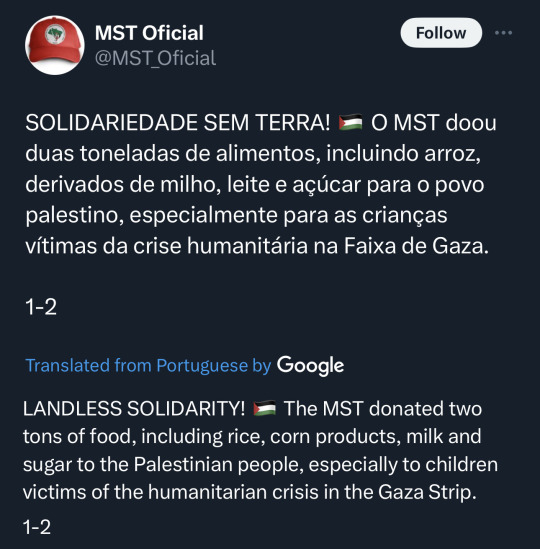
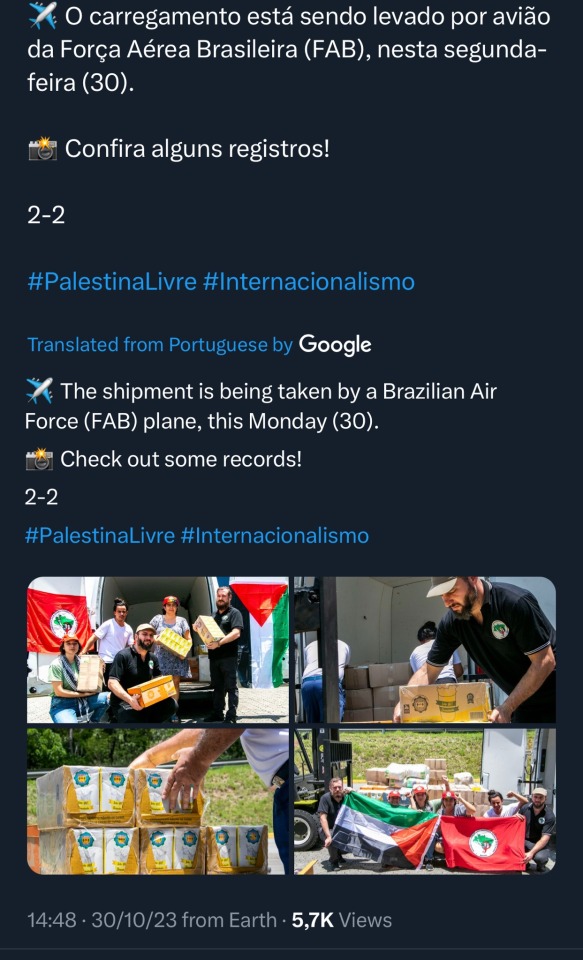
MST says they hope to have donated a 100 ton by the end of the week.
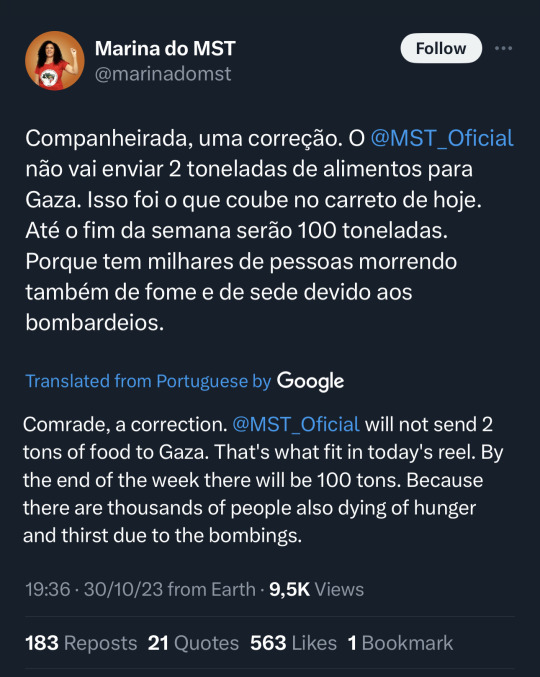
2K notes
·
View notes
Text
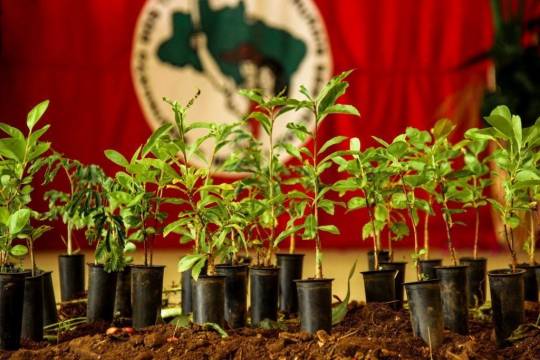
September 21, the Arbor Day.
1 note
·
View note
Text
Donation links to help feed the people displaced by the floods happening in Rio Grand do Sul
The Homeless Workers' Movement (MTST) and the Landless Rural Workers' Movement (MST) are doing crowdfunding projects to help feed the displaced population in Rio Grande do Sul.
To donate you need to make an account on the website. It's rather quick to make an account, and your browser should be able to translate the website.
Edit: If you scroll down, you will find instructions in english and links to donate with dollars, euros, and british pounds. So you don't need to make an account on the website.
MTST's crowdfunding campaign
MST's crowdfunding campaign
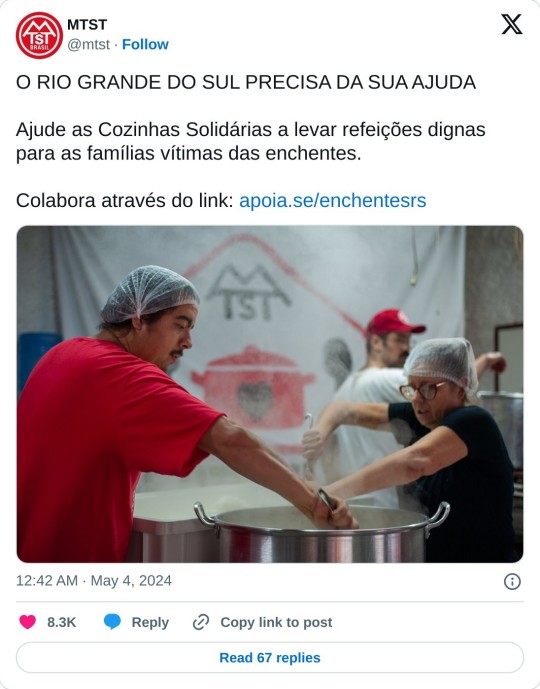
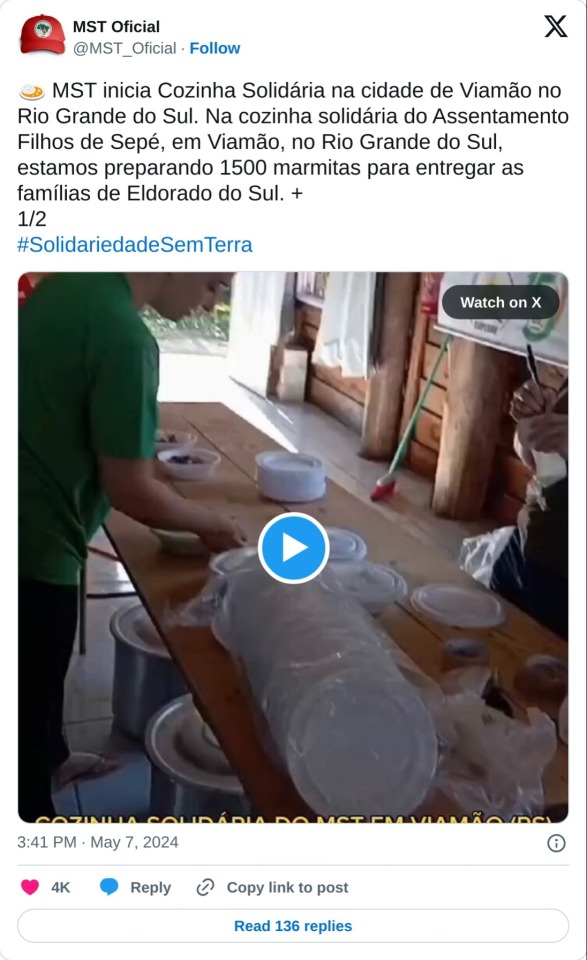
1K notes
·
View notes
Text
A few days ago, news was shared about the fires in Patagonia, fires that respond to foreign interests and the complicity of the national and provincial governments. I made my own post sharing fragments translated from independent media in Argentina. Now I want to talk about one of the consequences of the fires in Patagonia: the continued criminalization of the Mapuche people.
Since Tuesday, February 11, the Chubut Police have been raiding private homes, territories and media of several Mapuche communities, by order of the criminal enforcement judge in Esquel, Jorge Criado, and the prosecutor Carlos Cavallo.
In the words of the communitarian radio station Petü Mogeleiñ:
On Tuesday morning, February 11, we learned by telephone that the houses of Lof Cañio were being raided, as well as the house of our comrade Jorge Millán (J. M.), together with other nearby Lof, all belonging to the mountain range area of northwestern Chubut. Minutes later, comrades who were passing by to show solidarity with comrade Jorge and his family and to see how they were doing, became aware that the premises of our radio station, the Mapuche communitarian radio station Petü Mogeleiñ, located in the northwest of Chubut, in the town of El Maitén, were also being raided. Without any of its members being notified to enter, the provincial police, by order of Judge Criado and the prosecutor Carlos Cavallo, broke into our radio station, breaking the locks of the premises where the transmitter is located, the operating room, the archive room on the side of the building, the radio sum (where we have stored clothes and non-perishable food that are collected to help families in emergency situations), as well as in the home of a relative of our colleague J.M.
Raids were also carried out in Lof Pillan Mahuiza, where police beat an 80-year-old man, planted weapons in an empty house in the community, seized cell phones and arrested a woman, Victoria Dolores Fernández Núñez, who is accused without sufficient evidence of having participated in one of the fires (she is currently under house arrest). It was so violent that they even broke doors and windows, threw women to the ground and put seals on them. In the words of a community member: "At no time did they want to show us the warrant. It was only after many hours of having us detained here inside, because they would not let any of us out of our homes."
Video where the lonko (chief or head) Mauro Millán shows the damage done by police and gendarmerie. (Subtitles in Spanish)
Video in which the weychafe (warrior) Moira Millán, Mauro's sister, denounces the persecution of indigenous communities by the governor of Chubut, Ignacio Torres (without subtitles). She mentions near the end that several books were confiscated from her including: a book by Angela Davis, "Pampas y lanzas" by Liborio Justo, a book on Zapatismo, a book on indigenous women's rights and another on Maya women's access to justice, "El niño resentido" by César González and "Rebeldes sin tierra" a book by Carlos Aznárez that tells the story of the "Movimento dos Trabalhadores Rurais Sem Terra" (Landless Rural Workers Movement) in Brazil.
Even one of the books she wrote, "Terricidio", was seized from one of the people who is temporarily living in Pillan Mahuiza.
44 notes
·
View notes
Text


Dig For Victory!
Most people have a garden or could take on an allotment fairly near to where they live. Organising garden sharing schemes where people with gardens they can’t use team up with people who want to garden but don’t have gardens is a worthwhile step. We need to investigate ways of producing and distributing organic food in our localities in ways that maintain biodiversity and as far as possible outside the money economy. Think organic, low-impact farming won’t work? A recent study of sustainable agriculture using low-tech methods introduced on farms supporting 4m people in majority world countries revealed that food production increased 73%, crops like cassava and potato showed a 150% increase and even large ‘modern’ farms could increase production 46%. The future occupation and use of land will depend on the extent to which all who wish to do so have discussed and consented to such use, that those occupying or using the land continue to work in solidarity with the whole of society within broad principles of co-operation, sharing freely both the means of production and what is produced. No individual or group of individuals will have any ‘right’ to say “the land must be used in the way we decide” nor can what is on or under the land or produced upon it be their property, whether plant or animal. The number of people involved in agriculture (in its widest sense) will probably expand greatly, with vast estates and agri-corp holdings broken up and shared out but also urban farms created in and near towns. The aim of agriculture (and associated activities like food processing) will be self-sufficiency for the localities and specialization or growing for ‘export’ only where there is surplus land or productive forces. It is likely that neighbours, co-workers, communities and communes will collectively agree that land will be used in particular ways according to a plan or program of beneficial change. This will not always be in the direction of development or ‘efficiency’ (which will have different definitions and parameters anyway); if people need more gardens or wilderness, small-holdings instead of sheep stations, they will create them.
To many people this will sound utopian. However we believe that if this approach was developed widely – and applied to our other vital needs — it could subtly undermine the credibility and power of the global economy (as well as having obvious personal benefits in terms of health etc). It is an important part of building social solidarity and a community of resistance in majority world communities. It would be a way of showing our solidarity with these majority world movements based around issues of land use, access to resources and so on: communities of small farmers are organising seed banks to preserve crop diversity as well as launching more militant attacks on the multinationals such as trashing fields of GM cotton and destroying a Cargill seed factory. In the longer term as (hopefully) numbers and confidence increase, large long-term squats will become a possibility on land threatened by capitalist development either for roads, supermarkets, airports etc or for industrialised food production being taken back for subsistence food production and as havens of biodiversity. We should take inspiration from the Movimento Sem Terra in Brazil where in the face of severe state repression and violence hundreds of thousands of landless peasants/rural proletarians have occupied large tracts of unused land.

Although it is clear that food prices are so low that they are not a major factor in tying people into the capitalist system (rents, mortgages and bills do so far more effectively) it seems to us that a population capable of and actively involved in producing much of its own food outside of the money economy will be in a stronger position in the event of large scale struggles against capitalism involving strikes, lockouts, occupations and campaigns of non-payment etc. Many thousands of people are being forced by the government to take low-paid, shitty jobs or mickey mouse workfare schemes and threatened with loss of benefit if they refuse. We could support that refusal by offering surplus food from allotments and gardens to those suffering the state’s oppression. There is also the possibility of people developing similar independence from the money economy in other spheres as well — housing, energy production, waste management, health care etc which would also be highly beneficial but which is beyond the scope of this text. So to summarise our practical response should consist of: 1) a massive campaign of direct action; 2) a consumer boycott and propaganda campaign against corporate injustice, focussing on issues of sustainability and social justice; and 3) attempts at collective withdrawal from the industrialised food production system.
#anarcho-communism#anarcho-primitivism#anti-capitalism#capitalism#class#class struggle#climate crisis#colonialism#deep ecology#ecology#global warming#green#Green anarchism#imperialism#industrialization#industrial revolution#industrial society#industry#mutual aid#overpopulation#poverty#social ecology#anarchism#anarchy#anarchist society#practical anarchy#practical anarchism#resistance#autonomy#revolution
37 notes
·
View notes
Text
Though other classes and social sections will be important partners in the historical movement to destroy capitalism (its highest stage of imperialism) they cannot provide leadership. In each instance the issue of liberation is specific – land in the case of landless peasants, caste oppression for Dalits, male chauvinism for women, ethnic oppression for Adivasis, national oppression for oppressed people, religious persecution for minorities and so on. Being specific they are also partial, in the context of the whole revolutionary project. But this is not the situation of the proletariat. Capitalist bondage is different from earlier exploiting systems like caste-feudalism. It imposes no other compulsion on the workers other than the pangs of hunger. And since, in principle, they are free, there can be no specific liberation suiting them. Every form of exploitation and oppression must be ended. Thus the emancipation of the whole of humanity becomes a precondition for the liberation of this class. The leading role of the proletariat derives from this objective social position. It obliges the proletariat to continue the revolution all the way up till realising a world rid of exploitation.
If this Marxist understanding of proletarian leadership is absolutised it would certainly lead to reification. Both the history and present of the international communist movement illustrate how this emerges with mechanical equations, where proletariat = revolution and communist party = vanguard. On the other hand, economist impulses often seen in the upper strata of the proletariat, social passivity engendered by revisionist, reformist politics that strengthen this economism, and changes seen in the nature of labour and work places, have given rise to views that abandon the proletarian leadership concept. Carried away in the tide of identity politics, they believe that, in future, these movements will give leadership to social change.
Thus we have the two. At one end, reification of the proletariat and the communist party, selfishness that hoists this banner to justify fleeting necessities as common interests. At the other, the lethargic plea to reduce our sights to the partial, to abandon the noble task of an exploitation free world since it is a mere myth. Maoism cuts through this vicious circle. The leading role of the proletariat and the vanguard position of its communist party are potentialities contained in historical circumstances. They can only be realised through creative intervention in the historical moment of a specific society. Similar to other phenomena, this too is a unity of opposites
Ajith, On the Maoist Party
83 notes
·
View notes
Photo

On this day, 25 July 1898, the United States invaded the Caribbean island of Puerto Rico. The US government claimed that they were liberating Puerto Rico from Spanish colonial rule. The event took place amidst the so-called Spanish-American war which also affected Cuba and the Philippines. By December, the US force of over 15,000 troops was victorious. However, rather than liberating Puerto Rico, instead US troops became the new occupying power. Spanish colonists in Puerto Rico were then given US citizenship, and US troops began protecting Spanish landowners from attacks by landless rebels and independence activists. The new US colonial power focused on overseeing the takeover of land by large sugar corporations, harvested by workers paid in company chits rather than money. By 1910, sugar corporations controlled over 60% of arable land on the island. In 1917, the US eventually granted citizenship to all Puerto Ricans, but the ruthless exploitation of Puerto Rican workers continued. Working class and anti-colonial struggles broke out continuously, like the strike of sugar workers in 1934, and a wave of workers' and land struggles in the 1960s. Public pressure forced concessions to be granted, like the introduction of an elected governor in 1948 and Commonwealth status granting partial autonomy in 1952. Over time the Puerto Rican economy also became more and more integrated with and dependent on the US. Meanwhile, the US Federal Bureau of Investigation attempted to infiltrate and disrupt pro-independence movements. In 1967 a plebiscite was held on the future status of the island given the options of a continuing Commonwealth, US statehood or independence. 60% of voters chose a continuation of Commonwealth status, with 39% backing statehood and only 0.6% voting for independence. Puerto Rico remains under US control to this day. More information, sources and map: https://stories.workingclasshistory.com/article/9748/us-invades-puerto-rico https://www.facebook.com/photo.php?fbid=667573708749181&set=a.602588028581083&type=3
154 notes
·
View notes
Text
This is The Farming Left: these land workers share a politics, united by the concept of food sovereignty: the right to control of local food systems, which originated with farmers in the Global South. ‘We’re talking about equitable access to resources to enable localised food supplies’, explains Fernandes. These organisations are tackling the challenges of access to land in an unequal landscape: the Ecological Land Cooperative, for example, purchases large plots and obtains planning permission for dwellings before parcelling them up into affordable smallholdings. The Kindling Trust in Manchester is also seeking to foster a new generation of agroecological farmers. The Trust, which was established in 2007, has a veg box scheme and a community garden, and also offers training to new entrants, but there has always been a long-term plan to establish a cooperative farm. Since raising over a million pounds from more than six hundred investors last year, the Trust is looking to purchase a 120-acre farm in the Manchester area. ‘We want people to feel ownership in whatever way they get involved’, explains co-founder Chris Walsh. Whether they are founding members, workers, investors, or tenants, they will all be represented equally on a governing board. There ‘is a need for a rural radicalism’ of this kind, argues Chris Smaje, farmer and author of A Small Farm Future (2020). ‘It’s about trying to de-commodify land and take it out of speculative ownership’, he explains. For Smaje, who plans to purchase a 20-acre plot to be divided up among several small-scale farmers, the goal is ‘to build a land-based community’ and ultimately ‘generate more of what we need within our own communities’. While the radical agrarian community in the UK pales in comparison to the strength of conservative farming interests, this fight for land – and the right to use it – is happening on a global scale. The international peasants’ movement is connected through the 200-million strong La Vía Campesina, linking groups such as Brazil’s Movimento dos Trabalhadores Rurais Sem Terra (MST), or ‘Landless Workers’ Movement’, which has, since the 1980s, been occupying land to their counterparts across the world. The world’s farming Left is a David to big agribusiness’s Goliath, the latter having been bolstered by states, major international institutions, and the liberalising of global political economy since the Second World War. From Zapatistas to Scottish crofters, the peasants’ movement is fighting to turn the tide on our social and ecological future before it is too late.
86 notes
·
View notes
Text
Though other classes and social sections will be important partners in the historical movement to destroy capitalism (its highest stage of imperialism) they cannot provide leadership. In each instance the issue of liberation is specific – land in the case of landless peasants, caste oppression for Dalits, male chauvinism for women, ethnic oppression for Adivasis, national oppression for oppressed people, religious persecution for minorities and so on. Being specific they are also partial, in the context of the whole revolutionary project. But this is not the situation of the proletariat. Capitalist bondage is different from earlier exploiting systems like caste-feudalism. It imposes no other compulsion on the workers other than the pangs of hunger. And since, in principle, they are free, there can be no specific liberation suiting them. Every form of exploitation and oppression must be ended. Thus the emancipation of the whole of humanity becomes a precondition for the liberation of this class. The leading role of the proletariat derives from this objective social position. It obliges the proletariat to continue the revolution all the way up till realising a world rid of exploitation.
Ajith, On the Maoist Party
4 notes
·
View notes
Text

Movimento Sem Terra (Landless Workers' Movement translation free) just donated 2 ton of food to Palestine.
For anyone that doesn't know, MST fights for access to the land for poor workers through land reform in Brazil, and activism around social issues that make land ownership more difficult to achieve, such as unequal income distribution, racism, sexism, and media monopolies.
They know what is not having a place to live freely, I'm very proud.
#i know things are hard right now#but where there's kindness there's hope#again I'm free Palestine#and if you are not please leave
4 notes
·
View notes
Text
Landless Rural Workers and Indigenous peoples take joint action in reforestation activity in Brazil
The activity, part of the Landless Rural Workers' Nature Day, was joined by Minister Sônia Guajajara
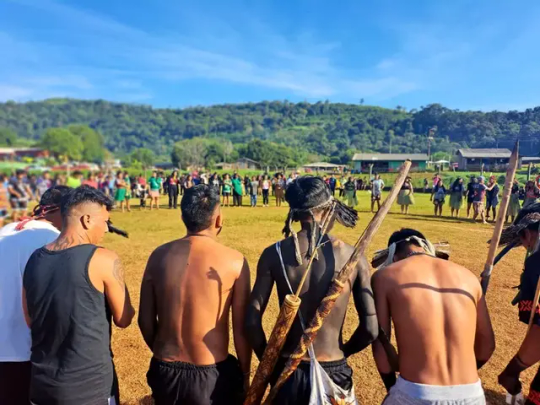
In a joint action, the Landless Rural Workers' Movement (MST, in Portuguese), Kaingang and Guarani Mbya Indigenous peoples airdropped three tons of juçara and araucaria palm seeds. The activity in Rio das Cobras Indigenous Land in the state of Paraná, southern Brazil, is part of MST's Nature Day.
The event held on Tuesday (4) was attended by the Minister for Indigenous Peoples, Sonia Guajajara; the head of the Presidency's General Secretariat, Márcio Macêdo; and the interim Minister for Agrarian Development, Fernanda Machiaveli.
Indigenous leaders from different regions of the state came to personally hand over their demands to federal government representatives. This is the first time Sonia Guajajara has visited an Indigenous land in Paraná as minister.
In a document drawn up after a meeting of Indigenous leaders the previous night, they demand the demarcation of lands, public policies to promote agriculture, policies for access to housing and improvements in Indigenous health and education.
Continue reading.
#brazil#brazilian politics#politics#environmental justice#indigenous rights#landless workers' movement#kaingang people#guarani mbya people#sonia guajajara#image description in alt#mod nise da silveira
38 notes
·
View notes